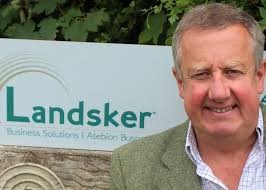Landsker – The Early Years
So, this is my second blog, in a series of seven. Sorry it has taken a while to compose this one; I’ve been busy!
The Twin Towers weren’t the only things to come crashing down on September 11th 2001. The butterfly effect of this utter catastrophe reached global proportions, and I wasn’t immune from it. Within one month I lost all of my contracts with major corporate clients and was acutely aware it was make or break time. For three months, suited, booted and briefcase in hand, I began the process of reinventing and rebuilding my then, “one man band” business. I attended networking events around Wales, making contacts, marketing myself and exploring potential leads. I soon realised it wasn’t just the business that needed reinventing; my corporate pinstripes and city persona just weren’t suited to the rural business community I found myself in, so along with my business focus, my wardrobe had a complete overhaul too. I ditched the suits for a checked shirt and gilet; far more conducive to building rapport with business owners who were getting “their hands dirty” every day running their businesses.
As chance would have it (or perhaps because sheer bloody mindedness to succeed), the networking paid off when I was introduced to a businesswoman who had a contract with the Welsh Government. Impressed by my credentials, she invited me to join her on a consultancy basis working on the aptly named ‘New Business Start Programme’, a programme designed to support startups in their early days of trading. For two years she was very much the intermediary, and I was the consultant. I’ll never forget the advice she gave me very early on, “Jeremy, work hard, keep your nose out of politics and just focus on the client”. That advice has served me well and is still one of my operating mantras.
The first SME client I worked with had plans to change the use on a former care home to a hotel. With my first degree being hospitality related, I was excited about the prospect of working in a sector different to those I’d worked with previously and was pleasantly surprised at how quickly I acclimatised. That hotel is still thriving and prosperous today.
After two or three years of working with the intermediary and having found my feet in relation to how one conducts oneself with driven, hands on, highly motivated but poorly focussed SME owners/Directors, I concluded it was the right time to cut out the middleman and contract directly to the Welsh Government. I bid for a contract called ‘Environmental Goods & Services (EGS) and got onto the framework to provide support to SME’s across Wales in all sectors. That was the start of our key strategy to contract directly with the Government and major public sector organisations, and to date we’ve successfully delivered around 25 – 30 different long term contracts or projects consistently achieving the required outputs and outcomes, and never having a single contract withdrawn.
Around this time, a eureka moment struck in the early hours of the morning after too much “vin rouge”. Some clients had voiced their concerns about the difficulty in finding rural premises to work from. I had a dilapidated cowshed in the grounds of my home which would make a perfect business centre. A successful bid for Rural Conversion Grant in 2004/5 from Carmarthenshire County Council provided significant funds, allowing me to complete the works and turn the ruined cowshed into a state-of-the-art business centre to accommodate 20 people.
It was 2006/7 before the Centre opened and we were ahead of the game with ‘hotdesking’ and ‘remote working’ still largely unfamiliar terms, yet the concept proved to be a popular one. The Council even used images of the workspace on their project documents to highlight good rural diversification. I look back at the project fondly. It was such a logical fit. The Council Conversion Grant meshed naturally with my vision for the cowshed, and when I advise businesses now there has to be a logic and synergy to their thinking to develop their businesses appropriately. Their idea needs to be a good one, the person needs to have compatible or appropriate skills, market forces need to be conducive, and the location has to be right. If these elements are all covered, more often than not, everything else aligns and the project is successful. Of course, another benefit of having a lovely office at my home is that I have a ten second commute to work!
I’m not shy about sharing that I was terrified of failing when I started out, but this fear drove me. I couldn’t afford to fail. There wasn’t a plan B which forced me to focus purely on plan A. The Welsh rugby team did not need an ageing Number 12 and I was not going to move from Whitland where the family had settled. This drive meant that within 9 months of reinventing myself the progression had overtaken my expectations in terms of job satisfaction, earning and future growth potential. 9/11, although utterly devastating for many, had actually been the catalyst to the evolution of Landsker. You could also call it kismet or ascribe to, “clouds and silver linings”!
You may be wondering how I came up with the name Landsker. Prior to changing it we had been known as Jeremy Rees and Associates, but early on I realised we’d benefit from a rebrand and I felt using my name to market myself was egotistical. Landsker is historically a mythical line separating parts of Carmarthenshire and South Pembrokeshire with North Pembrokeshire dating back to Viking times. Home is 50 metres from the Landsker line, it’s memorable, easy to spell, geographically and bilingually neutral (A note to myself, perhaps one day I should walk its entire length whilst I can shuffle along at my own pace!).
The menu of services I developed after the rebrand was very much linked to my MBA. The course radically transformed the way I thought about life and how I delivered work, as well as providing me with an invaluable box of tools and analytical techniques which I could apply to a plethora of business situations. I have always been curious and interested in people, but now I have developed my own “recipe” in how I liaise with and tease out that key information, allowing me to define practical solutions to either eradicate or mitigate a wide range of business issues associated with business’ “growth pains”. As a result, I’m really keen to encourage my staff and my clients, irrespective of age or circumstance, to continually professionally develop. Personally, I am really interested in AI and how it can be used to benefit clients – some may say I have been demonstrating Artificial Intelligence for years!
For about six months I worked on a major project for an insurance company in Dublin, Ireland. By day I was the project manager by night I was a very poor Micheal Flatley. On that project, I was told by a gnarled Management Consultant, who would do the bare minimum to get by, that I “care too much about the clients”, his sentiment was obviously meant in a negative light, but I’m glad he said this to me. I can’t do what I do unless I care about the clients;I’m far more interested in the outcome and benefit to the client than the remuneration Landsker receives. My philosophy is that if you focus on the “care” first, the commercial aspects will take care of themselves.
I got to a stage where the work was piling in, and I knew it was time to start recruiting a team. I met David Selwyn who had a totally different yet complementary skillset to me, and he became my first employee paid for via a government grant, initially just to help out on a Go Wales scheme for ten weeks. Twenty years later he is still here and is now Technical Director. I realised that the more administrative and menial jobs I kept hold of the more the business growth was stunted. I needed to protect my time, focussing on strategic growth rather than getting bogged down with the operational side of the day-to-day office tasks. I continued to expand the team, delegating to administrators and less experienced business consultants. As the team grew, we stopped the hotdesking service at the business centre and made it Landsker’s home. Our mission statement was ‘Adding Value Every Day’ and although we changed the statement in 2019, our approach to add value every day still remains.
So there you have it, a snapshot into Landsker’s evolvement and formative years. Join me next time as I tell you about the establishment of Landsker Business Centre and Rapid Growth.



